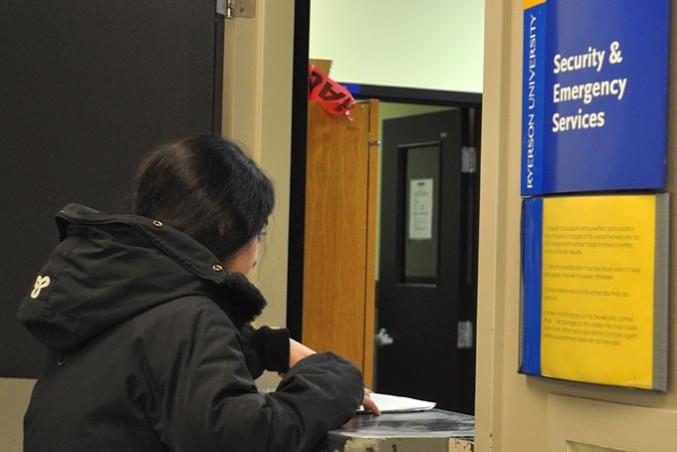By Brennan Doherty
When invigilators supervising exams tell you to place your bag at the front of the room and your phone in the plastic bags provided, they aren’t following standard school policies – they’re following vague guidelines.
The recent report of a cellphone theft on Feb. 26 during a midterm exam prompted The Eyeopener to investigate Ryerson’s policies surrounding the placement of electronics during exams. Our findings show that there are no concrete rules. Ryerson Security and Emergency Services told The Eyeopener
that during the midterm exam, students had been instructed by their professor to leave their cell phones on a table at the front of the room.
The phone was stolen during the test. Security does not monitor midterm exams.
Security reports that the phone has since been recovered and returned to the student. However, what students are supposed to do with their electronics is still not clear.
Policy 135, a Ryerson senate document governing final exam policies, only has two references to students’ electronics during exams.
The first is a guiding expectation that students should “refrain from bringing cellular phones, personal audio equipment and other electronic devices into the examination room unless specifically permitted by the course instructor.” The second is a regulation governing students’ possessions and gives no mention of student electronics.
“All coats and bags must be placed in such a manner as to be inaccessible to the student while the examination is in progress.” The policy also stresses that Ryerson accepts no liability for lost and stolen items.
Senate secretary John Turtle told The Eyeopener that there is no official policy requiring distribution of clear plastic bags during exams.
“It is an initiative started some years ago, consistent with the general goals of Policy 135 to provide a good environment for students to write exams,” Turtle said.
Ryerson’s Office of the Registrar, the Senate policy mentioned above and individual departments point to each other and Policy 135 as being responsible for implementing exam procedure.
“The Office of the Registrar schedules the exams and distributes the examination schedule, but we do not oversee the proctoring of exams,” wrote Charmaine Hack, Ryerson’s university registrar, in an email. “For the most part, departments establish procedures and protocols within their areas within the senate exam policy framework.”
After contacting several departments, it was found that most department heads use the Senate policy framework as their exam policy.
“I don’t feel comfortable at all; I usually keep it somewhere close by. Even though you’re not allowed to keep your phones in your pockets, some invigilators allow that,” said Hamza Farooq, a third-year biomedical engineering student. “There’s no telling who might take it, whether by accident or intentionally.”
Invigilators are graduate students, faculty members, or outsiders hired by Ryerson to supervise exams. Some former invigilators say that there are not any standard policies on what to do in exams.
“What we were told last semester is that if you have your cellphone with you, you’re supposed to turn it off, put it in one of those bags and put the bag under your seat, because if you don’t put the bag under your seat there’s a high chance of it getting stolen,” said Michelle Keith, a graduate-level English student and invigilator for last semester’s exams.
“But I don’t think there’s a rigid policy on what to do,” Keith said.
“I don’t think there is a standard policy. I think it becomes more standard when it’s a final exam, in a bigger setting. But I think when it’s in a midterm, if you’re in the classroom, there isn’t one,” said Sydney Tyber, another former invigilator.
The senate policy expects invigilators and proctors, among other things, to “create an environment that is, to the greatest extent possible, supportive of students undertaking the examination.”












Leave a Reply